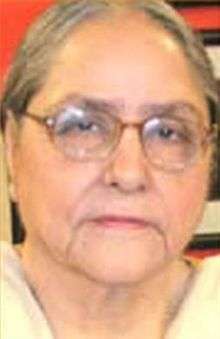Razia Butt
Razia Butt (Urdu رضیہ بٹ) was an Urdu novelist and playwright from Pakistan. Her novels typically have strong female protagonists, and have been dramatised in movies and television plays.[1][2]
Razia Butt رضیہ بٹ | |
|---|---|
 | |
| Born | 19 May 1924 Wazirabad, British India |
| Died | 4 October 2012 (aged 88) Lahore, Pakistan |
| Occupation | Writer, playwright, novelist |
| Nationality | Pakistani |
| Genre | Fiction |
| Subject | Socialism, romance |
| Notable works | Saiqa, Naila, Bano, Najia |
Background
Razia Niaz was born in Wazirabad on 19 May 1924.[3] She spent most of her childhood in Peshawar.[4]
Career
She first appeared in a literary journal around 1940 when she was in her teens.[5] She later developed her first published story into a novel, Naila.[6]
Married in 1946, Razia Butt resumed writing in 1950s after a break of some years. She has 51 novels and 350 short stories to her credit.[7] She also wrote radio plays. Some of her novels, such as Saiqa and Naila, were adapted for the big screen, and Noreena, Najia, Saiqa and Bano for TV drama serials.
Popular with many generations of readers, Razia Butt came up with an autobiography, Bichhray Lamhe.[8][9]
Bibliography
Novels
- Aadhi Kahani (Lit: Half a story)
- Aag (Lit: Fire)
- Aaina (Lit: Mirror)
- Aneela
- Bano (adapted as TV drama Dastan)
- Beena
- Chahat
- Darling
- Faslay (Lit: Distances)
- Mein kon hon (Lit: Who am I?)
- Naila
- Najia
- Nasoor
- Noreena
- Reeta
- Roop
- Sabeen
- Saiqa
- Samina
- Sawaneh
- Shabbo
- Zindgi (Lit: Life)
- Amma (Mother) (adapted as TV drama written by Ahmed Naveed)
- Mehru
- Zari
Others
- Bichhray Lamhe (autobiography)
Dramatisation of works
Television
- Amma (mother) dramatized by drama writer Ahmed Naveed.PTV
- Bano as Dastaan – Hum TV 2010
- Naila
- Noerena (PTV 1995)
- Saiqa – Hum TV – 2009
Films
- Naila (1965)
- Saiqa (1968)
- Anila (1969)
- Noreen (1970)
- Mohabbat (1972)
- Khalish (1972)
- Payasa (1973)
- Mohabbat ho to aisi (1989)
- Gulabo (2008)
External links
- Razia Butt
- Razia Butt complete novels in pdf format
References
- Razia Butt
- Abbas Akhtar (18 May 2008). "Writer & Novelist Razia Butt in Brunch w/ Bushra P-3/5". Vidpk.com. Retrieved 21 October 2012.
- "Great Urdu novelist Razia Butt passes away aged 89". Samaa Tv. Retrieved 21 October 2012.
- "Razia Butt is no more". Paklinks.com. 5 October 2012. Retrieved 21 October 2012.
- Rayan Khan (July 10, 2011). Rasheed Butt: The life and times of a calligrapher, The Express Tribune
- عارف وقار بی بی سی اردو ڈاٹ کام، لاہور (1 January 1970). "BBC Urdu – فن فنکار – ناول نگار رضیہ بٹ انتقال کر گئیں". Bbc.co.uk. Retrieved 21 October 2012.
- "Novelist Razia Butt passes away at 89". The News Tribe. 5 October 2012. Retrieved 21 October 2012.
- "Novelist Razia Butt is no more". Dawn.Com. 5 October 2012. Retrieved 21 October 2012.
- شائستہ جلیل، کراچی (4 October 2012). "مشہور ناول نگار رضیہ بٹ انتقال کرگئیں". Urduvoa.com. Retrieved 21 October 2012.
- "Novelist Razia Butt dies at 89". The Nation. 5 October 2012. Retrieved 21 October 2012.
- "Fiction writer Razia Butt dies". Central Asia Online. 5 October 2012. Retrieved 21 October 2012.